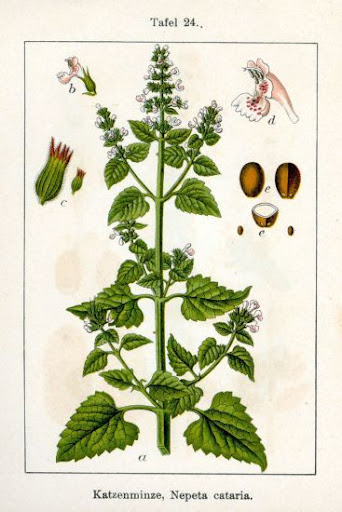
As I write this, I am waiting to pick up my first ever cat companion, “Mr. Meow-gi,” also called “Tommy the cat,” from the veterinary clinic. I always thought of myself as a dog person through and through but then, one fateful eve about a month ago, I more or less fell into the role of a cat owner. I adore their independence and ability to turn grown men into bumbling, baby-talking idiots with a coy and calculated look (such coveted gifts!). So, with felines on the mind, I want to share the all too overlooked wonders of Catnip with you!
Most of us think of catnip purely as a kitty cocktail, something to entertain and intoxicate our furry friends of the feline persuasion. However, to stop there would be selling short this incredibly multifaceted herb. Common catnip, Nepeta cataria, is a member of the mint (or Lamiaceae) family. It has been long used by humans as a tea, infusion, tincture, and even smoked for its calming effects, to ease upset stomachs, reduce fevers, chills, aches and pains, and to help relieve joint pain and rheumatism. I like to drink catnip as a tea, in a blend with chamomile (Matricaria recutita) , oatstraw (Avena sative), and passionflower (Passiflora incarnata) to alleviate anxiety and promote rest and relaxation. Considering these characteristics, it might not be surprising to learn that catnip shares a similar chemical structure with the Valarian plant.
 …but those are just reasons why us humans love catnip. Your cats love it because it contains a terpene called nepetalactone. When cats inhale this fragrance, they begin to exhibit the range of actions associated with kitty intoxication, purring, rolling on the floor, etc, likely reacting to similar “feel good” pharamones. Interestingly, only cats over the age of eight months usually respond to the herb, and even after those eight months, 10%-30% of cats will not become susceptive to the nepetalactone in catnip’s stimulating effects. That same terpene, nepetalactone, is also a potent insect repellant, and has been tested and reported to be more effective than DEET against flies, mosquitoes, and even roaches.
…but those are just reasons why us humans love catnip. Your cats love it because it contains a terpene called nepetalactone. When cats inhale this fragrance, they begin to exhibit the range of actions associated with kitty intoxication, purring, rolling on the floor, etc, likely reacting to similar “feel good” pharamones. Interestingly, only cats over the age of eight months usually respond to the herb, and even after those eight months, 10%-30% of cats will not become susceptive to the nepetalactone in catnip’s stimulating effects. That same terpene, nepetalactone, is also a potent insect repellant, and has been tested and reported to be more effective than DEET against flies, mosquitoes, and even roaches.This Valentines Day, consider showing love to yourself and your furry soul mate by sharing in some catnip and a candlelit salmon dinner.

No comments:
Post a Comment